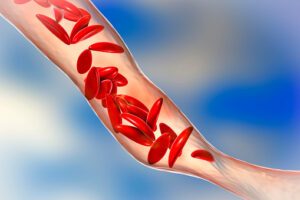Sickle cell disease (SCD) is caused by a single point mutation in the β-globin gene and affects around 100,000 people in the U.S. SCD can be cured in 14-20% of younger patients who have an HLA-matched donor, but allogeneic hematopoietic stem-cell transplants also carry risk of graft-versus-host disease, graft rejection, and even death. Based on ongoing phase 1-2 clinical trials, LentiGlobin (a lentiviral vector encoding a modified β-globin gene HbAT87Q) therapy holds promise to treat even more patients with SCD and reduce painful vaso-occlusive events. As reported in The New England Journal of Medicine, hematopoetic stem cells were collected and infected with LentiGlobin from 35 patients with SCD (all with βs/ βs genotype) with a minimum of four severe vaso-occlusive events in the past two years before study enrollment (median age, 24 years; 37% female). Patients with autologous LentiGlobin infusions were followed for 6 months to 3 years (median follow-up, 17.3 months); engraftment occurred in all patients. Vector copy number was stable in all patients up to 3 years; total hemoglobin levels increased from 8.5 g/dL to at least 11 g/dL over the course of the study; a mean of 85% of the red cells expressed HbAT87Q and contributed to at least 40% of the total hemoglobin; hemolysis markers also decreased. Importantly, all patients had resolution of severe vaso-occlusive events, severe adverse events all resolved within one week of onset, and no cases of hematologic cancer were observed. Follow-up is needed to determine the long-term effectiveness and risks of LentiGlobin therapy.
Reference:

